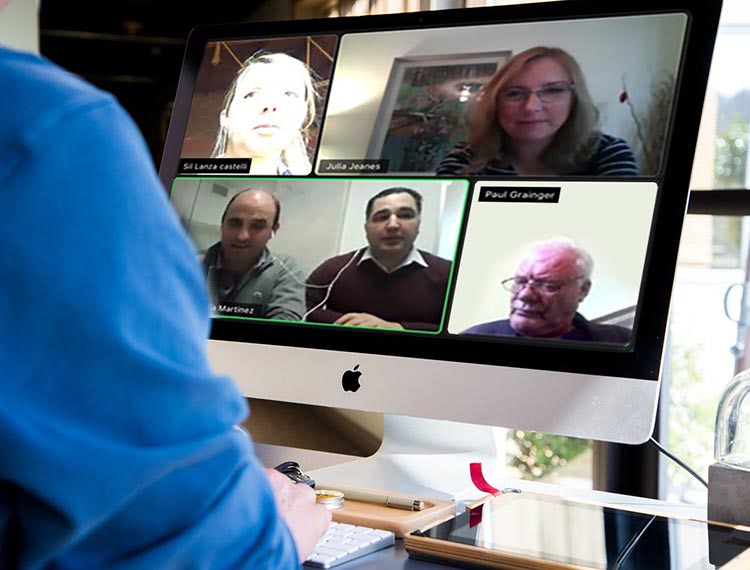Apprenticeships for a digital future: an international comparison

There is a fundamental paradox, if not a contradiction, at the heart of apprenticeships. Apprentices sign on to be introduced to work and the skills they need for the future by those who may be steeped in the skills and practices of the past.
Even before the COVID Pandemic the world was changing rapidly through the impact of artificial intelligence. Some have described this as the Fourth Industrial Revolution (4IR) which has brought new forms of employment (such as ‘gig’ workers hired through virtual platforms) and demands for new skills.
Obviously, the ability to manipulate data is one of these new skills but there are a host of others, including deeply human ones such as networking or creative design.
The COVID Pandemic has accelerated this process, and doubtless will continue to do so at breakneck speed as the economy adapts to new social paradigms. One only has to look at the improvements to virtual conferencing since March.
So where does this leave apprenticeships?
How can we improve the readiness of apprentices for a world fueled by data, navigating around wrecked supply chains? Globally, nations are reviewing their structures and processes for supporting transitions to work within the new economic and social arrangements.
In this article, we explore two approaches, within very different contexts, which may suggest ways forward those devising work based programmes.
We examine approaches to a digital future: one from the UK and the other from Argentina.
A UK approach to a digital future
Fashion Enter is a successful garment manufacturer and centre of excellence for skills development, based in London and Wales. The company has an extensive apprenticeship programme. In partnership with the University for Industry, and with UCL, it has recently developed digital resources for their extensive vocational and apprenticeship programme.
The company identified a need for digital resources that provide additional support and assessment for learners, as they grappled with the skills to work within a modern factory setting. They also wanted to attract a new generation of professional stitchers who are technical savvy and of the digital age.
Jenny Holloway, the CEO of Fashion Enter, firmly believes that you cannot be a designer, if you do not have technical skills. She says:
“Having spotted that gap in the market for technical skills and knowledge, resulted in us employing approximately 185 people. It’s quite difficult that a designer who spent three, possibly four years, doing a degree to then respond to the technical challenges of a real manufacturing setting.
“The industry in general has been characterized by sweatshop factories, with those in production paid three pounds an hour, and we have this awful perception that we’re all ‘Mike Baldwin from Coronation Street’.
“One of the problems we have is that it takes time to learn technical skills. If you are learning to dance, it will take you time and time again to become a proficient dancer. But digital and video resources supports the technical aspect of practice, a style of performance learning.
“In our company we now do virtual tours and they’ve been really well received. So I think we’ve really sort of tapped into a ‘treasure’ that we can do these exciting and new age videos that bring the learning for manufacturing into a completely different category.
“One thing that we’ve learned with the Fashion Technology Academy, which has been going since 2015,is that everyone learns differently; we’ve got kinaesthetic learners, we’ve got those that have impairments.
“By having a video they learn at their own time their own speed. They go backwards and they can really look at revisit this almost flipped learning. This isn’t learning in a traditional sense. The students are taking ownership. The way in which we have cleverly composed the videos was like, you couldn’t skip ahead. Students need to complete each stage by stage and really embed learning.”
An Argentinian approach to a digital future
In Cordoba, Argentina, the National Technological University (UTN) with the support of UNESCO Montevideo and the Argentine Ministry of Employment Promotion and Family Economy, is generating a complete program that may show the way.
It allows access to non-academic training schemes in new technologies and the dynamic context of the 4IR. This includes:
- a Diploma of New Technologies, a 224 hour program validated through an exam;
- Accessible Technologies for visual-disabled workers;
- Program for the Elderly People, Digital Technological alphabetization,
- an Integrar Program which develops students’ management skills and work on their emotional intelligence,
- a CNH in-company program which students study while on an internship in the company; and
- an ENLACE Y ANDEN program to development new technology-based ventures aimed at solving community problems in general.
The Sábato Triangle: Public and Private Sector and Universities
FEDERICO OLIVO ANEIROS, Industrial Engineer, MSc’s Degree in Business Administration- Secretary of University Extension and media relations and teacher at National Technological University (UTN) in Córdoba, Argentina
Federico Olivo Aneiros described the Argentine approach:
“Take up has been amazing, both from the private sector and regional government. This reflects the Latin American concept of the Sábato Triangle: public and private sector and universities. The private sector supports programs and projects that aim to reduce the gap between theory and practice, where the learning curve can be considerably reduced for the benefit of company knowledge.
“We maintain a connection with the industrial sector, from the internships that our students carry out in different companies, requesting profiles of our graduates according to their requirements while bringing continuous training and technological and knowledge transfer.
“The challenge is how to change the paradigm and train our workers in such a way that they can position themselves for the digital age and have access to quality, 21st Century jobs that will generate wealth and can boost the Argentine economy in the near future.
“We are adapting to current times. Education is always behind and following the new paradigms. The design of new ways of transferring knowledge and the contents and of new study programs aligns to the need to develop human capital. In the case of engineering, we have an advantage. Argentina today has a demand from the private sector that exceeds the market supply. The country needs to connect with the productive sector and develop science and technology to strengthen the productive matrix of our country. Countries no longer weigh their wealth only by their natural resources; they do so by developing the degree of knowledge that society has as a whole. New training courses must have and include the new technologies. We must be capable of transferring knowledge to society in every aspect referring to integrated innovation of knowledge production: technology for agriculture, software development, Industry 4.0, video game development.
“A.I. should not be seen as a threat, but as an opportunity. Some believe that technology will end the old jobs. This may be partially true, but through new technologies we can generate new jobs. Therefore, the real challenge will be to prepare people to join this knowledge revolution, without being left out of it. In some cases, it will be better to unlearn old concepts, in order to acquire new ones. This is not re-training, but rather a new way of teaching that is now upon us, where those who want to be trained demand a different role than before. The Greco-Roman training method is over; the one where everything the teacher said was fact. Nowadays everything is debated, education is more horizontal due to the degree of information that students carry. We are facing students who want to be protagonists, active in training, part of the knowledge, but aware, that information is not equivalent to knowledge. The knowledge economy has this challenge as its main objective, and that is to be able to generate a technological revolution with the incorporation of robotics, AI, IOT, 3D manufacturing, and to be able to achieve that, we need policies that encourage investment in this sector, with a transformation in the educational system. This should allow us to generate quality jobs, increase our GDP and enhance the economy of our country through knowledge.”

Eng. Fanny Montoya: Information Systems Engineer – Testing & CI Advisor. Teacher – Researcher at Universidad Tecnológica Nacional – UTN FRC
Fanny Montoya is a coordinator at PGDip in Software Testing. She describes her experiences in a successful training scheme, principally in IT, and especially in Software development and testing. She tells us about the successful results in Software Quality Assurance (QA) Profile training.
Students with this qualification progress to outstanding positions in several companies of the Córdoba technology cluster where they are encouraged to develop their engineering careers.
In 2020, there was an agreement between the software companies and the Córdoba government to generate a program called CLIP whose objective is training in new technologies for the next job opportunity in companies that enroll in this program. The companies agree to hire those who follow the course.
Collaboration across institutions and a global view of apprenticeships schemes are key to effective success.
It is important to generate spaces for frequent discussions between countries that encourage the sharing of experiences with initiatives that support and involve companies to offer high-quality work-based learning.
The old learning methodologies are obsolete with regard to younger generations even if they are executed in technological platforms. Learning is not looking for information by clicking, but building a new knowledge process, to learn by doing.
The ways of learning, training and being part of the production of knowledge is collaborative and requires an active and critical role in the learning process.
Those who design training schemes must do so with real practical application, increasing the integration in an incremental way in production processes and teamwork.
Work-based learning, as recognized by the OECD, is often seen as a powerful vehicle for developing workplace skills and promoting productivity of the labour force1.
The development of apprenticeship systems creates significant challenges: engaging employers to provide work placements; making apprenticeship attractive to young people who might otherwise pursue academic studies, and in delivering skills that are both immediately valuable but also support future career development. 2
It is important to look beyond the paradigms of training and work. Technical and Vocational Education and Training should establish a clear link between the learning environment and the work environment. 3
Any program seeking to prepare students for new jobs in a sector, involving new technologies and software, must focus on developing skills and new competences by creating spaces for professional training within an employment context. It is important to encourage and collaboration across different stakeholders, whether from the public or private sector, to generate new vocational learning networks.
Sil Lanza Castelli, National Technological University, Julia Jeanes, UCL, and Paul Grainger UCL
References:
- “Work-based learning and productivity”, OECD.org. OECD Better policies for better lives. Last update 05-OCT-2020
- “Strengthening incentives and implementation for apprenticeships, ”, OECD.org. OECD Better policies for better lives. 05-OCT-2020.
- “Supporting innovation for recovery”, FE News. P.Grainger&S.Lanza Castelli. 27-05-2020











Responses